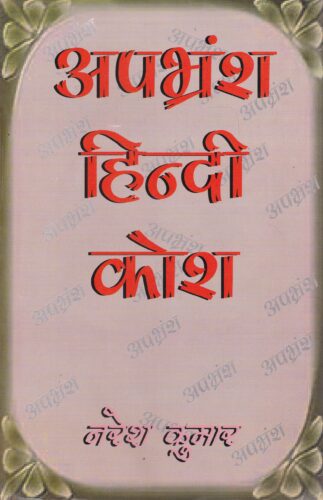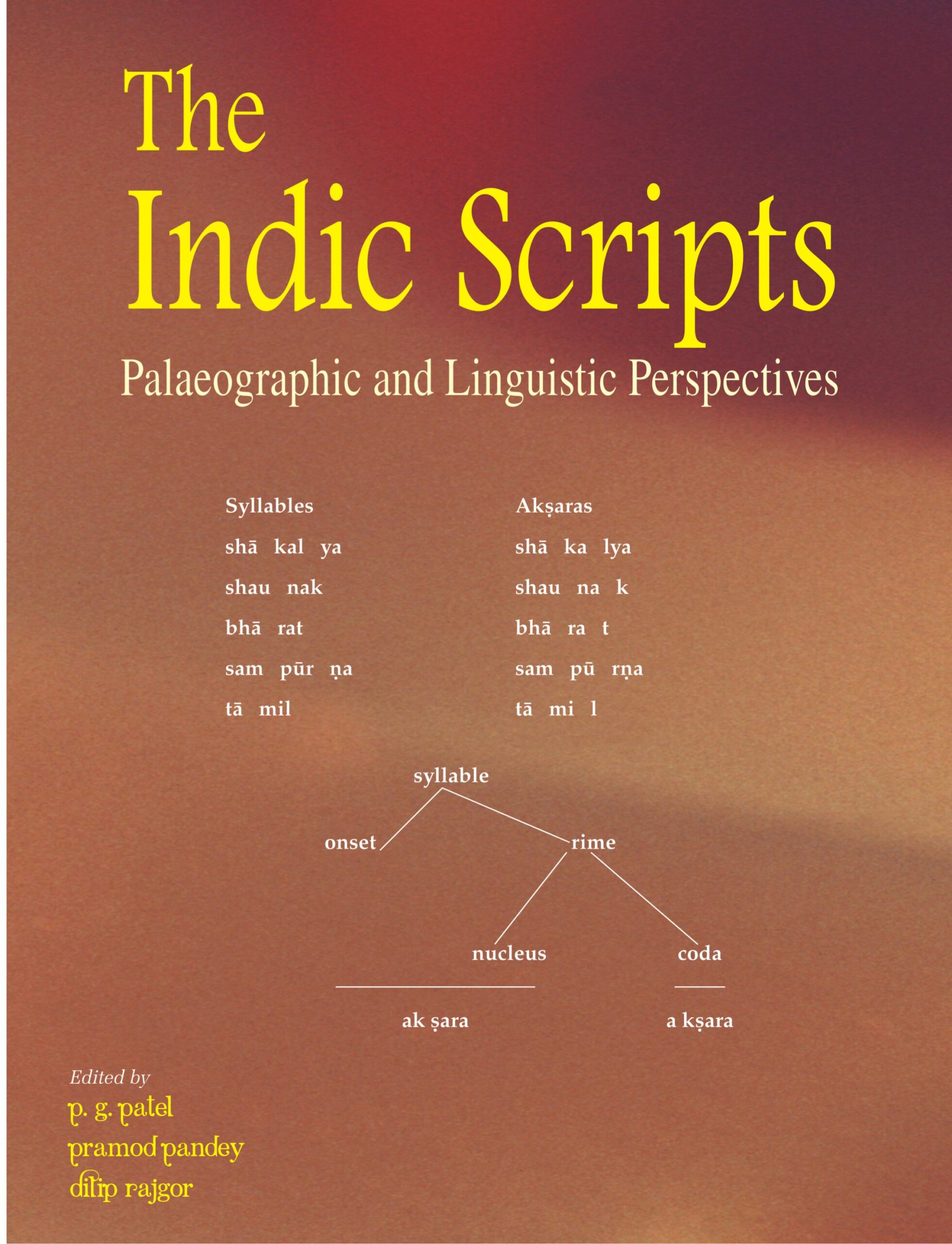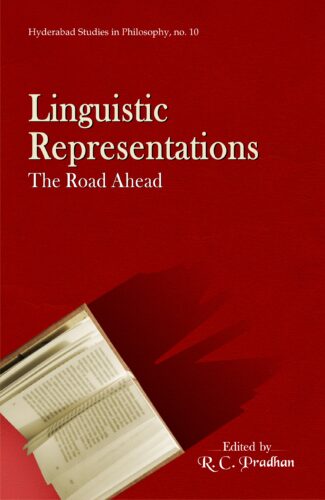

Apbharamsa Hindi Kos...
Apbharamsa Hindi Kosha
Apabhramsa-Hindi-Dictionary by: Naresh KumarThis Dictionary of Hindi Apabhramsa gives in detail the grammatical importance of words, their meanings, correct spellings, the alternate words and their various usages as mentioned by lexicographer Naresh Kumar.
₹1,500.00 Original price was: ₹1,500.00.₹1,350.00Current price is: ₹1,350.00.
ISBN: 9788124601365
Year Of Publication: 1999
Edition: 1st
Pages : xlv, 869
Language : Hindi
Binding : Hardcover
Publisher: D.K. Printworld Pvt. Ltd.
Size: 23 cm.
Weight: 1500
This Dictionary of Hindi Apabhramsa gives in detail the grammatical importance of words, their meanings, correct spellings, the alternate words and their various usages as mentioned by lexicographer Naresh Kumar.

- Sale!Meaning and Language by: Satya Sundar Sethy
₹600.00Original price was: ₹600.00.₹540.00Current price is: ₹540.00.This volume explores the nature of meaning and the way it functions in language. Philosophers such as Aristotle, Thomas Acquinas, John Locke, Immanuel Kant and David Hume had keen interest in the study of meaning, though it was not central to their philosophical inquiry. But the contemporary philosophy takes a radical twist towards language which is characterized as linguistic turn in philosophy. Meaning and its correct characterization are the foremost concerns of contemporary philosophy.
Study of two semantic perspectives meaning atomism and meaning holism is the core content of this book and it mainly focuses on contrasting these two perspectives or models of meaning and evaluates them with a view to arrive at an explicit conception of meaning that will correctly reveal the semantics of natural language.
In doing so, it vividly discusses the two perspectives of meaning along with the atomistic theory of Gottlob Frege, Wittgensteins approach to meaning, logical positivists conception of meaning, why meaning atomism fails to capture the uniqueness of meaning, Quinian theory of meaning holism, Davidsons approach to meaning holism, and Later Wittgensteins view on meaning holism, thus covering a wide gamut of the topic. - Sale!Sanskrit Education and Literature in Ancient and Medieval Tamil Nadu by: Chithra Madhavan
₹650.00Original price was: ₹650.00.₹585.00Current price is: ₹585.00.Education, especially Vedic and Vedantic, along with allied subjects, was a prime focus of the rulers of the Tamil kingdoms. This book highlights the educational initiatives during the reigns of the Pallava, Pandya, Cola, Vijayanagara, Nayaka and other kings.
The inscriptions across the Tamil country talk about Sanskrit education in detail. Agraharas, ghatikas, temple-colleges and mathas were the main educational institutions propagating Sanskrit texts. The teachers were handsomely paid and bhatta-vritti was the norm of the day; villages were donated to them Þ either as ekabhoga or as agrahara (brahmadeya). There were poets and composers among the rulers, as an embodiment of their dedication to education. The numerous grants act as authentic sources of information on the reigns of these rulers, scholars, composers and educational institutions across many centuries Þ beginning from the Pallava times.
Giving a deep insight, this book is an invaluable source of information for students and researchers in the ancient and medieval history of India. - Sale!Linguistic Traditions of Kashmir by: Mrinal Kaul, Ashok Aklujkar,
₹1,250.00Original price was: ₹1,250.00.₹1,125.00Current price is: ₹1,125.00.The present volume mainly consists of original research papers. It is not a collection or anthology in which specialists of the different aspects of Kashmirian use or study of language were invited to write essays surveying the aspects best known to them or to produce state-of-the-art reports about the scholarly study of the aspects. An effort, however, has been made in the Introduction to provide the general background that a reader may need in order to situate the papers in the proper intellectual and historical context. The Introduction further outlines the themes that could and should be particularly explored to lead us to a fuller and sharper understanding of Kashmir’s analytical engagement with language. The appendices toward the end of the volume then complement the Introduction by presenting objective and practical information about the manuscripts etc. of works in Sanskrit. The volume could connect the results of the work done in the past with the work to be done in the future by adding to knowledge in the present because of the articles it attracted from veteran as well as upcoming researchers. The reader will find here discussions bearing upon texts, as well as discussions bearing upon the authors of texts; discussions devoted to elucidating single passages, as well as discussions exploring instances of intertextuality; and discussions exclusively addressing individual grammars, as well as discussions engaging in the relation of one grammatical school with another.
- Sale!Indic Scripts by: P.G. Patel, Pramod Pandey, Dilip Rajgor,
₹1,400.00Original price was: ₹1,400.00.₹1,260.00Current price is: ₹1,260.00.This volume presents the advances in the ongoing research on Brahmi and its daughter scripts used in the present day India. It brings together two main trends: evolutionary-historical development and linguistic grounding. This is the first attempt to cross-fertilize palaeography and linguistics. The palaeographic papers cover the main issues in the decipherment of the Indus Valley script, the origin and evolution of Brahmi, and the palaeographic methods and considerations employed in the decipherment of scripts. These present different trends and arguments of writers on the origin of Brahmi as having been around the Mauryan era or at a much earlier stage, relate to broader historical and cultural issues. They also deal with the need for the use of established and more current palaeographic techniques in classifying regional and stylistic variants of scripts. The linguistic papers in the volume explore the issues of the roots of the orthographic unit aksara in Vedic phonetics, its claim as a minimal articulatory phonetic unit, and the properties of Brahmi as a generative writing system. The philosophical and linguistic underpinning of the concept aksara is shown to thread its use in the varieties of treatises, from the Vedas to phonetic texts. The papers help in providing linguistic evidence for historical accounts of the script as an invention at a given time or as an evolving evolutionary system, apart from relating the development of the script to the linguistic history of India. Palaeographers epigraphists, linguists and computational scientists, will find this volume interesting and useful.
- Sale!Linguistic Representations by: Ramesh Chandra Pradhan
₹990.00Original price was: ₹990.00.₹891.00Current price is: ₹891.00.The essays in this volume deal with the nature of linguistic representations as distinguished from other types of representations, including mental representations. These study language and linguistic representations, examining crucial questions like nature of language and language as a source of knowledge, accommodating linguistic representations within the broad framework of truth-based semantics and hermeneutic interpretation of language. The essays focus on the structure and limits of linguistic representations from both the Indian and Western perspectives. The semantic problems of meaning, reference and truth constitute the main issues facing any theory of linguistic representations and, therefore, these issues have been discussed in-depth. Besides, there has been an effort to understand how to locate the language-reality relationships within a broad representationalist framework. The essays take up many specific topics, examining theories of linguistic representations, such as the anti-representationalist stand of Wittgenstein and Derrida, Grice’s theory of meaning, and perspectives of Indian classical schools such as the Naiyayikas’ perspective on testimonial knowledge. The essays specially focus on the Indian theories of grammar and linguistic representations to highlight how philosophy of language, whether classical or contemporary, can hardly get rid of the semantic locus of meaning and truth.
The volume will prove invaluable to scholars of philosophy, especially those concerned with language and linguistic representations.







